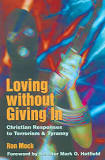Loving Without Giving In: Christian Responses to Terrorism and Tyranny
By Ron Mock
Cascadia Publishing House, 2004
ISBN: 978-1931038249
Review by Douglas Balzer
Some books address critical issues. Loving Without Giving In addresses the problem of terrorism that has cast a long dark shadow for Christians worldwide, as well as broad sections of the world’s societies and governments. This shadow has caused some important questions to come forward, pressing issues, urgent inquires, especially for American Christians. How do Christians live out the mandates of Jesus of loving their neighbors and enemies simultaneously? Is the Golden Rule applicable in the context of nations? How complex is the task of identifying terrorists and their sponsors? Ron Mock contemplates tough questions and endeavors to answer these in addition to more complex problems facing the world in the all too familiar environment of global terrorism.
Mock provides a view into the complexity of working through times of crisis. As Associate Professor of Political Science and Peace Studies at George Fox University, Ron teaches, and researches, as well as works on nonviloent activities for resolution and reconciliation of conflicts. Besides his position at GFU, Ron is a Quaker and has been a member of the International Quaker Working Party of Israel and Palestine.
In a series of lectures concerning Islam and the West, Ron spoke on the topic of “What are our options for dealing with ISIS?” The lecture was the last in the series, but I found it to be the most compelling and informative. Following up the talk lead me to this book. It quickly captivated my reading as I devoured the contents.
What is terrorism? Ron approaches the process by examining the problem of ambiguity surrounding terrorism. The necessity of having an understanding of what is the legitamate actions of a government or a revolutionary government in waiting for its ascention to power need clarification. The problematic piece is differentiating between legal and illegal actions of governments that result in viloence. Ron goes onto further develop the definition of terrorism by naming the objectives, targets, intent, and the inflicting of the vivid suffering it seeks to make a useful tool of violence to raise the level of fear in local and global populations.
The book is not about using scare tactics to create a false conversation. In fact, it is one of the most useful books to begin an in-depth, honest discussion concerning the presence and influence of terrorism in our psyche, spiritual life, and political environment surrounding the relationship between Islam and the world.
Ron’s argument is based on practical theology that is scripturally sound and that speaks to a broad Christian representation. His examination of the roots of terrorism speaks profoundly to the broken and messy human condition. The spiritual roots he examines illustrate the corrosive nature of grievances and the dehumaninzing hatred they spawn. He presents the political roots that come out of political despair and economic challenges of poorer nations, as well as tackling the myth of Effective Violence to bring about desired political and social change.
The author goes on in the book to look at the realtionship and history of Christianity and War. There is a candid look at the subject of Holy War and the Old Testament within the Theocracy of Israel: the leading of God in war, the permissible tactics, the radical obedience of Israel, and the deep spiritual self-examination issues within the context. He speaks to the New Testament and the instructions of Jesus for his followers towards non-lethal, nonresistant, love for God, and love for others behavior. The virtues and values of the Kingdom of God are a central concern for all followers of Christ. He doesn’t leave the reader with only these two views but brings forward the discussion for a holistic biblical view about what consititues a Just War and the test to determine if it exists. “Just” means focusing on civilian immunity as non-combatant.
The book contains a depth of material and is written in a captivating manner. Ron draws the reader toward the necessity of having a Christian worldview. The stipulations of Jesus, the characteristics of Loving God and Loving others must become the heart of his followers. Fighting violence with violence is counterproductive and incompatible with the Christian life. Ultimately, Ron draws the actions we as Christians should be inspired to take: first, always love our enemies. Second, when attacks occur, let them lead to reflection first. Third, whatever action is taken, respond to the violence of terrorism; do not respond through the drive of vengence, retaliation, or rage. Fourth, as Christians, we need to be wide open to God’s leading.
Frankly, I had surprisingly not heard of this book before now. It is relevant today despite its 2004 publishing date. It is a book that I highly recommend for anyone, Christian or non-Christian, to read. It effectively challenged the general thinking of the status quo thought process without complaining, condemning, or criticizing, but presented another perpective of viewing our situation today, that we face as global citizens of the Christian faith. I hope you find this book as challenging and compelling as I did. You will have to order a copy of the book. It is not available on Kindle or Nook.

